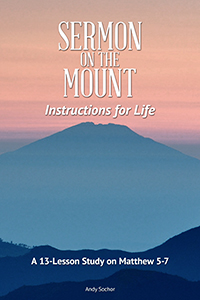
“Not everyone who says to Me, ‘Lord, Lord,’ will enter the kingdom of heaven, but he who does the will of My Father who is in heaven will enter. Many will say to Me on that day, ‘Lord, Lord, did we not prophesy in Your name, and in Your name cast out demons, and in Your name perform many miracles?’ And then I will declare to them, ‘I never knew you; depart from Me, you who practice lawlessness’” (Matthew 7:21-23).
These works are the deeds that we might do in service to God. Jesus explained that not everything we do for Him is accepted by Him. There are right works and wrong works.
The right works are those that are according to God’s will (Matthew 7:21). God’s will is found in what Jesus taught. He said, “My teaching is not Mine, but His who sent Me” (John 7:16). This message would then be sent from heaven by the Holy Spirit to the apostles. Jesus told them, “But the Helper, the Holy Spirit, whom the Father will send in My name, He will teach you all things, and bring to your remembrance all that I said to you” (John 14:26). These apostles were then commissioned to preach the gospel throughout the world and teach the disciples to “observe all that [Jesus] commanded” (Matthew 28:20).
The right works will be those works that are authorized in the word of God. Paul wrote, “Whatever you do in word or deed, do all in the name of the Lord Jesus” (Colossians 3:17). He told Timothy, “Retain the standard of sound words which you have heard from me” (2 Timothy 1:13).
The wrong works include whatever we think will honor the Lord. Notice that Jesus described people who claimed to do things in His name but were actually practicing lawlessness (Matthew 7:22-23). The problem is that we, as mere men, do not think like God. Yet many fail to see this. They believe that if they think a particular action will please God, then it must actually be pleasing to Him. The Lord rebuked the wicked, “You thought that I was just like you” (Psalm 50:21). Too many fail in this regard – they think that God is like them. Yet as we noticed earlier, the ways and thoughts of God are infinitely superior to our own (Isaiah 55:8-9).
There is only one set of works that is right. These are the works that are revealed in the word of God. Again, Paul told Timothy, “All Scripture is inspired by God and profitable…so that the man of God may be adequate, equipped for every good work” (2 Timothy 3:16-17). Following the Scriptures exclusively to determine which works are good will make us different because most people think that anything we do for the Lord is good. Yet we must do what He has told us to do. Jesus said, “Why do you call Me, ‘Lord, Lord,’ and do not do what I say?” (Luke 6:46). We must do what has been authorized in His word (Colossians 3:17), not presume to know what would please Him. When we attempt to make such presumptions regarding the will of God, we will fail. Paul explained why this is: “For who among men knows the thoughts of a man except the spirit of the man which is in him? Even so the thoughts of God no one knows except the Spirit of God. Now we have received, not the spirit of the world, but the Spirit who is from God, so that we may know the things freely given to us by God” (1 Corinthians 2:11-12). The only way we can know God’s will is to look at what He has revealed in His word. Therefore, the only way we can do what will please Him is to look at what His word defines as a “good work.”
The above post is an excerpt from the book, Sermon on the Mount: Instructions for Life. Follow the link to learn more about the book and purchase your copy today!
 We would like to announce our newest title –
We would like to announce our newest title –